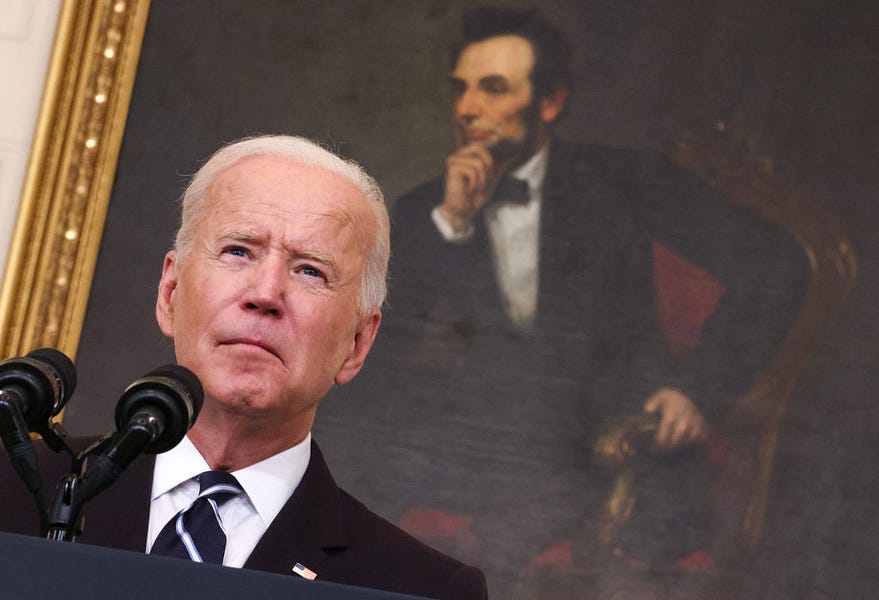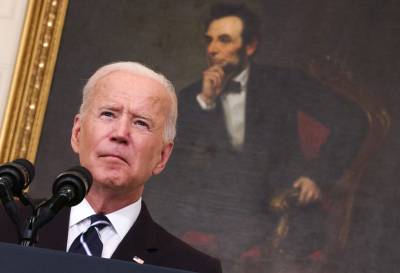Populist leaders throughout American history have railed against the Constitution’s limits on the desires of the people. But never in my lifetime have I seen such wanton disdain among our leaders for the Constitution as I have in the past decade.
As much as we would like to think of the presidency of Donald Trump as a special case, his contempt for our national charter in matters small, medium, and large—while singular in history—is also part of a trend. When Barack Obama was president, he abused his authority right out in the open, too. Now, after just eight months in office, President Biden seems determined to claim his place in the hall of fame of constitutional contempt. After saying he lacked the power to prevent landlords from evicting those who don’t pay their rent, Biden did it anyway. Before the ink had set on the Supreme Court’s decision striking down that action, Biden invented yet another power for himself: to force private employers to require their workers to get vaccinated.
What the New York Times calls a “novel use of a law on workplace safety” is an invented power that violates the letter and spirit of Article II’s limits on the president’s powers. But as has been the case for much of Washington's decade-long journey into constitutional contempt, this one will end up as pure partisan applesauce. Biden supporters who would have had a fit if Trump had done something similar will stand silent. Biden’s foes who abetted Trump in his worst constitutional abuses will thunder (and raise money) in their umbrage. Indeed, the worst part of Biden’s power grab is that he did it knowing it would deepen divisions as it thrilled the left and outraged the right. But even if it were only a cynical political ploy, that would not lessen its violence to the Constitution.
Nor would a noble goal. Trying to get more Americans vaccinated is urgent and well within federal powers during a pandemic. Biden’s requirement that federal employees get their shots and his order that those entities receiving federal funds mandate worker vaccines are good, practical, and constitutional. But the interstate Commerce Clause does not allow the president to make private companies his proxies for a national vaccine mandate.
Progressives like to point to the six aspirations listed by the Framers in the preamble to the Constitution—particularly the promotion of “the general Welfare.” Obama’s most important and perhaps best speech was the one he gave on March 18, 2008, when Hillary Clinton’s campaign was inciting a media frenzy worthy of a “vast right-wing conspiracy” over Obama’s wild-eyed pastor in Chicago, Jerimiah Wright. Obamaphiles call the speech, which was delivered at the National Constitution Center in Philadelphia, “A More Perfect Union” for the then-senator’s invocation of the preamble as his theme. He returned to the same place and the same theme for his 2020 convention speech, where he spoke of the Constitution’s “North Star,” which he said is “a democracy through which we could better realize our highest ideals.”
To the ears of Obama and many across the political spectrum, that preamble is more than a mission statement. It’s a kind of executive summary of the document. Like Unitarian Universalists preachers do with the teachings of Jesus of Nazareth and his disciples, today’s progressives and nationalists treat the Constitution as something flawed and outmoded, but valuable for its aspiration … at least as they see them.
But, of course, that’s not what the preamble is at all. It’s a sales pitch. The Framers wanted voters to know that justice, domestic tranquility, common defense, the general welfare, and the blessings of liberty were the reasons to “ordain and establish this Constitution” [emphasis mine]. Their assertion was that the governing charter laid out in the following 4,377 words and signed 234 years ago this week was the best way to obtain those things—and to do so in a manner “more perfect” than the shaky coalitions in place since the founding 11 years before. There was already representative democracy in America and in the British Empire that the Founders fled. But this Constitution is far more than that.
It is the shortest, oldest constitution of any major nation in the world. And those two superlatives are closely related. It is limited in scope and definitive in nature, and therefore durable. It is not the law of the land, but rather the bylaws for governing the nation born of the Declaration of Independence. It mostly does not tell us and our leaders what to do, but rather how and when they may pursue their ambitions. Under the Constitution, the United States government can enact policies good, bad, left, right, prudent, or prodigal as long as they stay within the boundaries laid out in 1787.
Contrary to Obama’s claims, the Constitution’s North Star is its resistance to authoritarianism—even (or maybe especially) when a majority supports it. The Constitution and the Bill of Rights are fundamentally antimajoritarian documents that make it harder to give the people what they want.
The Constitution does not say that all the things that we deem to “promote the general Welfare” or the other aspirations listed in the preamble are therefore permitted. That would be like declaring that the purpose of baseball is to have fun and get exercise, so you can play on horseback, run directly from first to third, or hit the mascot with a fungo bat as long as it’s fun and you’re working up a sweat. Instead, the preamble is the explanation for why the rules must be strictly followed.
Our failed and derelict Congress helped create this mess not just by its selective, partisan defense of the Constitution from executive abuses, but by its inability to exercise its power to meet the demands of the people. Presidents have exploited this weakness and paved the way to authoritarianism as they went. We will not lose our liberty to leaders pursuing unpopular decisions, but rather to those who violate the American system to give the people what they want. With Biden’s recent gambits we’ve laid down fresh tarmac for that road to ruin.
Chris Stirewalt is a contributing editor for The Dispatch.







Please note that we at The Dispatch hold ourselves, our work, and our commenters to a higher standard than other places on the internet. We welcome comments that foster genuine debate or discussion—including comments critical of us or our work—but responses that include ad hominem attacks on fellow Dispatch members or are intended to stoke fear and anger may be moderated.
With your membership, you only have the ability to comment on The Morning Dispatch articles. Consider upgrading to join the conversation everywhere.